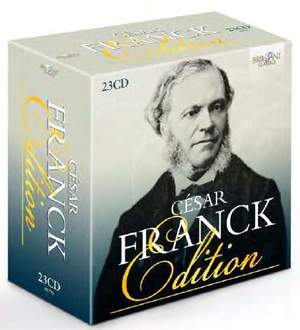This remarkable set reveals the full breadth and genius of a creative career known to most merely by the tip of the iceberg: a small number of seminal works written in the composer’s final decade of life. César Franck (1822–1890), although considered one of the foremost 19th-century French composers, was not in fact French by birth, but Belgian. He only became a full French citizen in 1873 after he had been appointed organ professor at the Paris Conservatoire. His career can be divided into three distinct periods, each characterised by the production of very different types of music.
From 1834 to 1846, under pressure from his father, he concertised as a piano virtuoso, and most of the works of this period were written with that purpose in mind. In the decade following his marriage in 1848 he composed virtually nothing but became celebrated as an organist, and he would bring the spacious dimensions of that instrument to his sound world in the years to come. His ‘middle period’ – from about 1858 to 1879 – was devoted to the production of works for organ, church music and a series of monumental choral pieces on religious or biblical subjects. In these three decades he wrote virtually nothing for the piano. From 1879 begins the decade of his late flowering in the great chamber and orchestral works, ushered in by his well-loved Piano Quintet and containing the pieces for which Franck is widely known. Spanning all three periods were opera and his small output of 18 mélodies.
Recordings date from 1976 to 2016
New liner notes on the composer and the music by David Moncur
Artists
François-Joël Thiollier (piano), Martijn van den Hoek (piano), Muza Rubackyte (piano), Mariana Sîrbu (violin), Ruxandra Colan (piano), Julia Severus (piano), Francesco Bertoldi (piano), Adriano Falcioni (organ), Joris Verdin (harmonium), Jos van Immerseel (piano), Isabel Kabatu (Léonor), Marc Laho (Stradella), Werner Van Mechelen (Spadoni), Philippe Rouilon (Duke of Pesaro), Xavier Rouilon (Pietro), Giovanni Iovino (Michael), Patrick Mignon (Beppo), Roger Joakim (An officer), Cornelia Kallisch (alto), Ingeborg Danz (mezzo-soprano), John Cheek (bass), Diana Montague (mezzo-soprano), Scot Weir (tenor), Reinhard Hagen (bass), Gilles Cachemaille (baritone), Keith Lewis (tenor), Juan Vasle (bass), Gé Neutel (soprano), Mariann Bódi (soprano), Attila Wendler (tenor), István Rácz (bass), Daniel Beckmann (organ), Francesca Scaini (soprano), Mattia Ometto (piano)
Arnhem Philharmonic Orchestra, Sofia Symphony Orchestra, Vilnius String Quartet, members of the Academica Quartet, Chorus and Orchestra of the Opéra Royal de Wallonie, Gächinger Kantorei Stuttgart, Radio-Sinfonieorchester Stuttgart des SWR, The Netherlands Radio Choir, Netherlands Radio Philharmonic, Kodály Kórus Debrecen, Mainzer Domorchester, Roberto Benzi, Vassil Kazandjiev, Paolo Arrivabeni, Helmuth Rilling, Jean Fournet, Salamon Kamp, Karsten Storck



